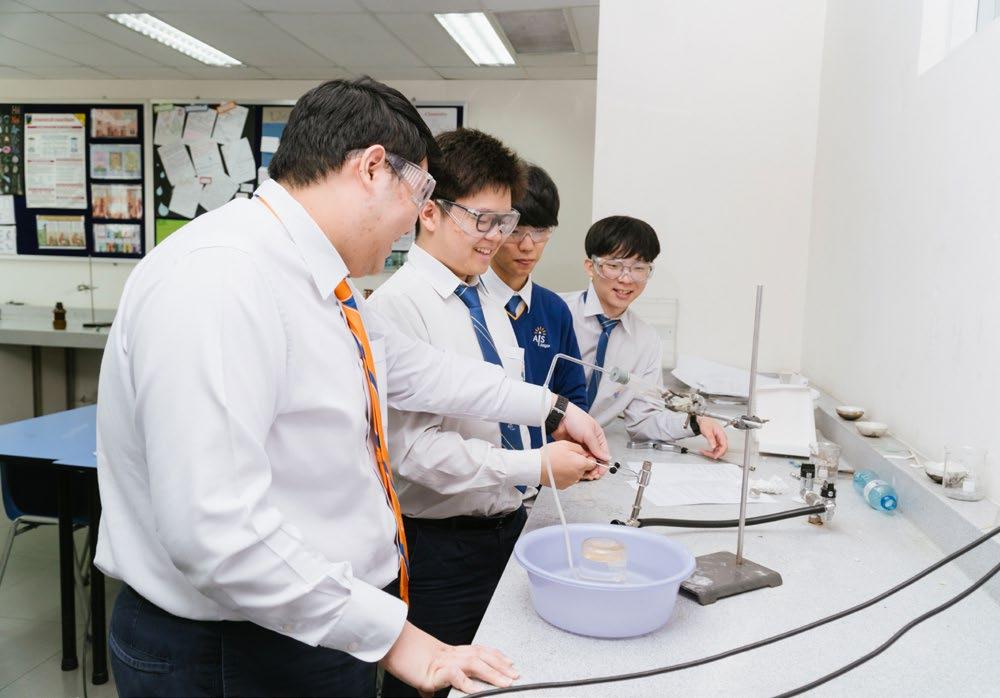
4 minute read
Group 4 Sciences
All Group 4 subjects include theoretical study and learning scientific investigative skills. The Nature of Science is an overarching theme in the Biology, Chemistry and Physics courses. At the Australian International School we offer the following group 4 subjects:
• Biology
Advertisement
• Chemistry
• Design Technology (DT)
• Environmental Systems and Societies (ESS)
• Physics
Biology
Prerequisite knowledge and prior learning
Past experience shows that students will be challenged to achieve a high degree of success in Biology at SL with no background in, or previous knowledge of, science. For students considering the study of Biology at HL, achieving excellent grades in Biology in the previous year would be necessary.
Course description
Biology literally means "the study of life". Biology is such a broad field, covering the minute workings of chemical nanomachines inside our cells, to broad scale concepts such as ecosystems and global climate change.
In Biology you will study not only the science of living organisms but also develop a broad understanding of the overarching principles of the subject.
Course content
Core (HL & SL):
• Unity and diversity
• Form and function
• Interaction and interdependence
• Continuity and change
Additional HL topics:
• Origins of cells
• Viruses
• Classification and cladistics
• Muscle and motility
• Chemical signalling
• Gene expression
Assessment SL
External Assessment:
• Paper 1 (36%): A) Multiple-choice questions - B) Data-based questions
• Paper 2 (44%): short-answer and extended-response questions
Internal Assessment (20%):
• One practical investigation planned, carried out, analysed and evaluated by the student.
Assessment HL
External Assessment:
• Paper 1 (36%): A) Multiple-choice questions - B) Data-based questions
• Paper 2 (44%): short-answer and extended-response questions
Internal Assessment (20%):
• One practical investigation planned, carried out, analysed and evaluated by the student.
Chemistry
Prerequisite knowledge and prior learning
Past experience shows that students will be challenged to achieve a high degree of success in Chemistry at SL with no background in, or previous knowledge of, science. For students considering the study of Chemistry at HL, achieving excellent grades in Chemistry in the previous year would be necessary.
Course description
Chemistry is an experimental science that combines academic study with the acquisition of practical and investigational skills. Chemistry is often referred to as the central science, as chemical principles underpin both the physical environment in which we live and all biological systems. Apart from being a subject worthy of study in its own right, Chemistry is a prerequisite for many other courses in higher education, such as medicine, biological science and environmental science, and serves as useful preparation for employment.
Course content
Core (HL & SL):
• Structure 1 - Models of the particulate nature of matter
• Structure 2 - Models of bonding and structure
• Structure 3 - Classification of matter
• Reactivity 1 - What drives chemical reactions?
• Reactivity 2 - How much, how fast and how far?
• Reactivity 3 - What are the mechanisms of chemical change?
Additional HL topics:
• Entropy and spontaneity
Assessment SL & HL
• Same as for Biology
Design Technology (DT)
Prerequisite knowledge and prior learning
Students who have not studied Design Technology before could possibly study DT but will find it very challenging. An interview with the teacher will be necessary. Generally, all DT students will need to have had prior exposure to Design Technology.
Course description
Design consists of gathering information about the problem or opportunity, processing that information, and planning for some kind of intervention either by modifying what is already there or by introducing something new. The designer is interested not just in the material environment but also in the social, technological, economic, environmental, political, legislative and ethical considerations that affect people’s priorities.
The DP Design Technology course combines technological theory with a significant amount of design-based practical work.
Course content
Core (HL & SL):
• Topic 1: Human factors and ergonomics
• Topic 2: Resource management and sustainable production
• Topic 3: Modelling
• Topic 4: Final Production
• Topic 5: Innovation and design
• Topic 6: Classic design
Additional HL topics:
• Topic: 7 User-centred design
• Topic 8: Sustainability
• Topic 9: Innovation and markets
• Topic 10: Commercial Production
Assessment HL
External Assessment:
• Paper 1: multiple-choice questions (20%)
• Paper 2: data-based, short answer and extended response questions (20%)
• Paper 3: Structured questions on HL extension material and a case study (20%)
Internal assessment (40%)
• Individual Design Project: an area of particular interest to the individual can be studied in some depth.
Assessment SL
External Assessment:
• Paper 1: multiple-choice questions (30%)
• Paper 2: data-based, short answer and extended response questions (30%)
Internal assessment (40%)
• Individual Design Project
Environmental Systems and Societies (ESS)
ESS is both a group 3 and a group 4 subject – details can be found under Group 3.
Physics
Prerequisite knowledge and prior learning
Past experience shows that students will be challenged to achieve a high degree of success in Physics at SL with no background in, or previous knowledge of, science. For most students considering the study of Physics at HL, achieving excellent grades in Physics in the previous year would be necessary.
Course description
The Diploma Programme physics course allows students to develop traditional practical skills and techniques and increase their abilities in the use of mathematics, which is the language of physics.
It also allows students to develop interpersonal and digital communication skills which are essential in modern scientific endeavour and are important life-enhancing, transferable skills in their own right.

Course content
Core (HL & SL):
• Space, time and motion
• The particulate nature of matter
• Wave behaviour
• Fields
• Nuclear and quantum physics
Additional HL topics:
• Rigid body mechanics
• Galilean and special relativity
• Thermodynamics
• Induction
• Quantum physics
Assessment SL & HL
• Same as for Biology







